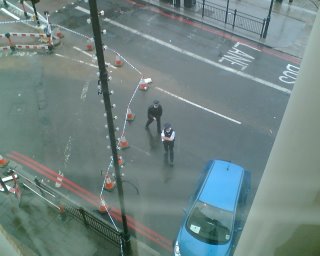A couple of months ago I posted about the Joseph Rowntree research into child poverty. Today's
Daily Mirror has facts and figures from the End Child Poverty Campaign that reinforce the scale of the problem and put into stark relief what this actually means for the poorest children and families - I thought it was worth quoting in full:
"ALMOST 10 per cent of single parents cannot afford to buy more than one pair of shoes for their children.
THERE are currently 3.4 million children in poverty, 27 per cent of all British children.
THE UK has the fourth highest level of child poverty of all 25 European Union countries.
FOR the first time, children are more likely to live in poverty than the elderly.
AROUND five per cent of all children live in severe poverty.
A SINGLE parent with two children aged 5 and 11 needs £205 a week to rise above the poverty line.
THE highest concentration of child poverty is in London where 41 per cent of children live in poverty.
48 per cent of all single-parent households live below the poverty line.
57 per cent of families with Pakistani and Bangladeshi background are in poverty.
20 per cent oi all British.larnilies receiving government tax credits are still the poverty line living below the poverty line.
ONLY Italy, Portugal and the Slovak Republic have worse levels of poverty than the UK.
BRITISH poverty rates are 50 per cent higher than in France and more than twice as high as in the Scandinavian countries
400,000 children have inadequate diets.
THREE quarters of a million children go without a warm waterproof coat or proper shoes in winter.
ONE million children are too poor to afford to visit family, have birthday celebrations or attend weddings.
A BOY in born Manchester can expect to live seven years less than a boy from Barnet, North London because of poverty-related health differences.
SIMILARLY, a girl born in Manchester can expect to live six years less than a girl born in Chelsea.
BABIES from poor families are on average 4.5ozs lighter than those from rich families because of poor nutrition.
TWO adults with two children would have to work 55 hours a week at the minimum wage to get above the poverty line.
TO be a living wage, the minimum wage would need to rise to £7.05 per hour from £5.35 today.
PARENTS must spend an average of £25 a week per child on everyday costs of going to school such as uniforms, trips and PE kit.
TYPICAL cost of a full-time nursery place is £142 making it impossible of many mothers to go back to work.
CHILDREN who are growing up in poverty are more likely to leave school at 16.
CHILDREN from families of unskilled labourers are 15 times more likely to die from a fire at home.
CHILDREN from poor backgrounds have on average 1.8 decayed teeth by the age of five.
For children from professional families the figure is 1.2.
23 per cent of single parent families cannot afford school trips for their youngsters.
AROUND 52,000 families with children became homeless in 2005.
INCREASING gas and electricity costs means three million families are expected to be unable to heat their homes this year.
AROUND three million people use doorstep moneylenders charging exorbitant interest rates to buy basics such as beds and school uniform.
SINCE 1999 the government has taken 700,000 children out of poverty by benefits and minimum wage. Another 300,000 would have to be taken out of poverty to meet its targets."
The constituency where my council ward is - Hackney South & Shoreditch - has the 6th worst level of child poverty - 47% - in the UK.
Dealing with this ought to be one of the Government's top priorities for the rest of this term of office.







